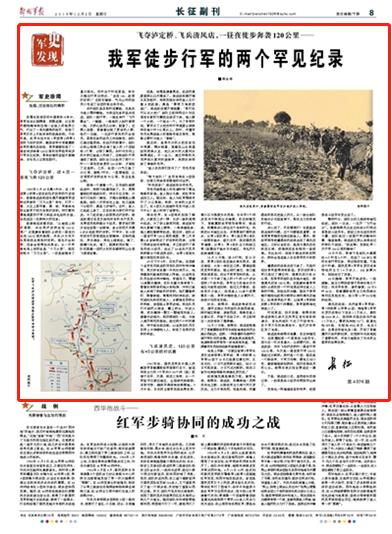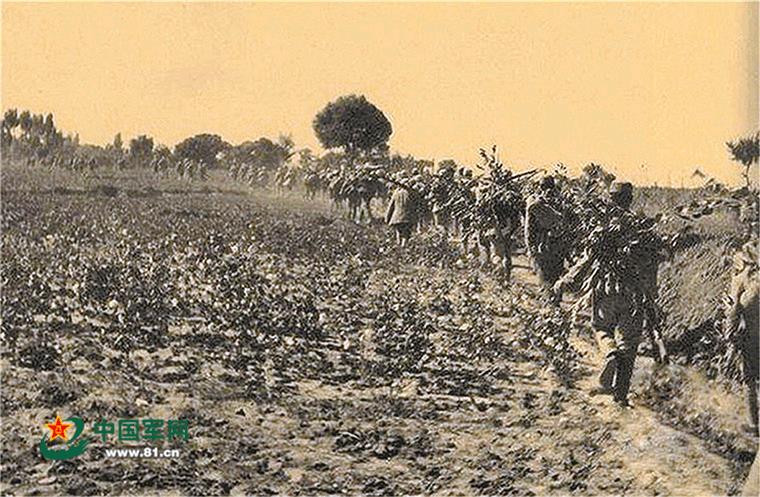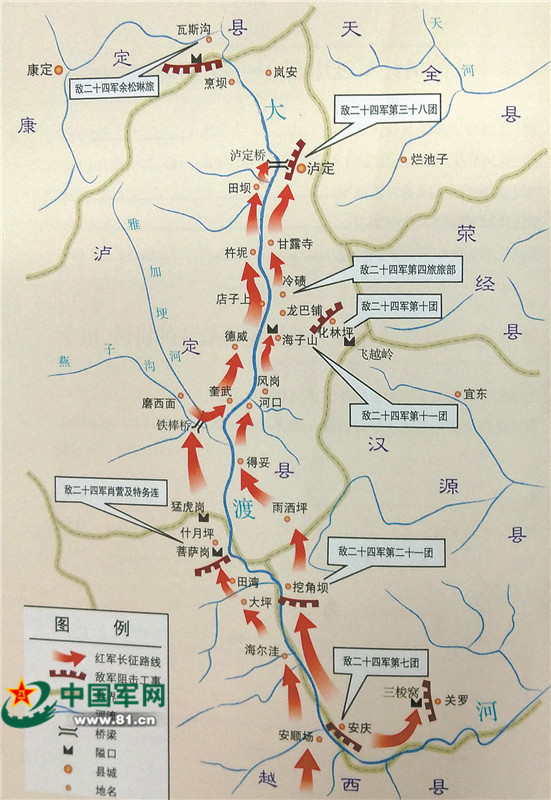In the long and arduous revolutionary struggle in China, the officers and men of our army fought a series of beautiful victories and created countless classic examples in the history of our army with the spirit of selfless sacrifice and the high morale of overwhelming all enemies. Coincidentally, during the Red Army’s Long March, the 4th Regiment of the 2nd Division of the Red Army Corps captured the Luding Bridge, and during the Qingfengdian Campaign of the Shanxi-Chahar-Hebei Field Army in the Liberation War, our army once created a rare record of the world army marching on foot for 120 kilometers day and night.Please pay attention to the report in today’s Liberation Army Daily-

Fly away from Luding Bridge and Feibing Qingfeng Store, and attack 120 kilometers on foot day and night-
Two rare records of our army marching on foot
■ Han Jinqiang

In the Battle of Qingfengdian, officers and men of the Shanxi-Chahar-Hebei Field Army ran into the position. Information photo

Schematic diagram of the red army’s flight to Luding bridge and the enemy’s deployment. Information photo
In the long and arduous revolutionary struggle in China, the officers and men of our army fought a series of beautiful victories and created countless classic examples in the history of our army with the spirit of selfless sacrifice and the high morale of overwhelming all enemies. Coincidentally, during the Red Army’s Long March, the 4th Regiment of the 2nd Division of the Red Army Corps captured the Luding Bridge, and during the Qingfengdian Campaign of the Shanxi-Chahar-Hebei Field Army in the Liberation War, our army once created a rare record of the world army marching on foot for 120 kilometers day and night. The indomitable spirit of the revolutionary predecessors is enough for future generations to remember and encourage.
Flying over the Luding Bridge, the Red 4 regiment flew 120 kilometers day and night.
At 5 o’clock in the morning of May 28, 1935, the 4th Regiment of the 2nd Division of the Red 1 Army Corps was on its way to Luding Bridge. Yang Chengwu, the political commissar, and Huang Kaixiang, the head of the regiment, received an urgent order from the Military Commission. When they opened it, they saw that it read: Huang and Yang, the Military Commission called the left-wing army to seize Luding Bridge tomorrow. You should use the highest speed marching force and resolute maneuvering means to complete this glorious and great task.
Yang Chengwu, a political commissar, said: "From the mileage marked on the map, there are still 120 kilometers from here to Luding Bridge!" This means that the troops must walk 120 kilometers in one day and night, and capture and completely control the Luding Bridge on the 29th. No one expected that the task would become so urgent. On the first day, the telegram of the Central Military Commission was marked as "urgent", but now it has become "urgent", which must be a major change in the enemy’s situation. At that time, due to the tight time, the order could only be conveyed while marching, "Walk 120 and get to Luding Bridge!" This resolute and vigorous mobilization slogan has become the belief and goal of the whole group.
At this time, the troops are racing against time and the enemy across the river. In order to ensure the resolute completion of the task, the troops marched all the way and held a "flying rally" all the way. Clusters of people gathered together temporarily, and after only a few minutes of mobilization, they dispersed; This group of people just dispersed, and then more people appeared. As they ran, they held a tense meeting to mobilize. The mobilization of emergency tasks has just been completed, and the troops are close to Tiger Hill. In the thick fog, the troops defeated an enemy regiment and a battalion with an avalanche and occupied Moses. At this time, the wooden bridge on the east river of the village has been blown up by the enemy, which has added trouble to the March of the troops. It took the troops two hours-a tense and precious 120 minutes-to build the bridge. After that, the whole group ran another 25 kilometers in one breath. At 7 o’clock in the evening, when we looked at the map, it was 55 kilometers from here to Luding Bridge, and it was all mountain roads.
One difficulty after another. Just as the troops continued to advance, it suddenly began to rain heavily. It’s dark as the bottom of an upside-down pot, and I can’t see my fingers. Only when lightning strikes can I tell which is the mountain and which is the road. The army didn’t eat for a day, and the road was very muddy, so it was really difficult to move. At this time, the enemy has caught up and is advancing parallel to us on the other side. In order to get to Luding Bridge before the enemy, Yang Chengwu mobilized all Communist party member, Communist Youth League members and activists through various party branches, asking them to try their best to overcome all difficulties and make sure to get to Luding Bridge before 6 o’clock tomorrow morning. During the March, the comrades of the Red 4 regiment carried forward the spirit of unity and friendship, pulling each other with ropes, helping each other with their hands, and then leaning on crutches; If you are hungry, chew raw rice; When you are thirsty, drink the rain … The team is rolling like a fire in the deep valley.
However, after all, it is touching the dark, and the speed of progress is obviously much slower than during the day. Yang Chengwu and Huang Kaixiang were worried when they suddenly found that the enemy on the other side was on their way with torches. It’s really "be bold when things are difficult!" Yang Chengwu asked Huang Kaixiang to discuss: "We can also light a fire!" The troops immediately bought all the bamboo fences of the villagers’ homes in nearby small villages, and each person tied a torch and lit one in each class. In order to gain time, it is required that the marching speed after the torch is lit must be kept above 5 kilometers per hour. At the same time, the trumpeter should be familiar with the contact sound and signal of the enemy, and be prepared to "contact" with the enemy when necessary.
In this way, the torches of the enemy and ourselves burn in the night sky, facing each other across the water, just like two fire dragons moving in the valley, reflecting the water of the Dadu River a few meters away. After a while, through the howling wind and rain and the waves of the Dadu River, suddenly there was a clear bugle on the other side.
"The enemy is asking us questions!" The bugler reported that.
"What troops?" Before Red 4 could answer, there was a faint voice of questioning from the opposite side.
"Blow the trumpet to answer!" Yang Chengwu told the bugler.
The bugler sounded the prepared answer according to the enemy’s number spectrum. The enemy believed it and regarded the Red Army as one of their own. In this way, the enemy and the Red Army walked 15 kilometers across the bank. Suddenly, the fire dragon on the other side disappeared. Red 4 regiment boldly blew the trumpet and asked what the enemy was doing. The enemy blew the camping horn.
Hearing this bugle, the Red 4 Regiment quickened its pace again. Everyone is moving forward in a three-step, one-fall, five-step, one-fall roll. In order to prevent falling into the river, Yang Chengwu told everyone to untie the straps on their legs and connect them one by one, each pulling the straps forward. In this way, the troops marched at a speed of 120 kilometers day and night, and arrived at the west bank of Luding Bridge at 6 o’clock the next morning, occupying all the coastal positions in the west bank, and immediately mobilized nervously, and selected 22 Communist party member and activists to form a commando team, with Liao Dazhu, the second company commander, as the commando captain.
At 4 o’clock on the 29 th, the general attack began. At the same time, the division team composed of dozens of trumpeters sounded the charge, and all our weapons fired at the other side together, and the bullets blew to the enemy positions like a whirlwind. All 22 commandos, armed with submachine guns, sabres in their backs and 10 grenades wrapped around their waists, led by captain Liao Dazhu, braved gunfire and bullets from the other side and rushed to Luding Bridge, where the bridge deck had been removed by the enemy. They climbed the bridge fence, stepped on the chain and crawled across the river. Desperately resist the defeated enemy and ignite the bridge slabs piled at the west bridge head in an attempt to prevent our army from entering the city. Commandos burned themselves regardless of the fire, climbed the bridge, rushed into the sea of fire, and threw grenades at the enemy one after another; Then rushed into the city, together with the follow-up troops, and launched a desperate street battle with the enemy. After two hours of fierce fighting, all the enemy troops on the defensive were defeated. Only 22 commandos were shot on the bridge and three people were killed, which created a miracle of capturing Luding Bridge.
Feibing Qingfeng Store, 120km and 45km competition.
In the autumn of 1947, under the continuous attack of the Shanxi-Chahar-Hebei Field Army of the People’s Liberation Army of China, the Kuomintang army was forced to shrink its main seven armies, totaling 33 divisions (brigades), into the triangle of Peiping, Tianjin and Baoding, and stationed one army in Shijiazhuang, in an attempt to rely on the railway line and take a defensive position to ensure the protection of Peiping, Tianjin and other strategic places. In mid-September, the Northeast Democratic Allied Forces launched an autumn offensive. In order to save the Northeast crisis, Chiang Kai-shek sent five divisions from Beiping to the Beining Line or to go through the customs to reinforce. In this case, the leaders of the Shanxi-Chahar-Hebei Field Army, such as Yang Dezhi, Yang Chengwu and Geng Biao, were determined to seize this favorable opportunity and attack the area north of Baoding, adopting the tactics of siege and Dayuan, and besieged Xu Shui with the 4th and 5th brigades of the 2nd column and the 3rd column to attract reinforcements from the Kuomintang troops in Peiping and Baoding. With the 3rd and 4th columns and the 7th independent brigade assembled in the northeast of Xu Shui, looking for opportunities to annihilate the enemy who came to reinforce.
On the evening of October 11th, the fighting started. By the night of 13th, my 2nd column even passed through the north and south of Xu Shui, approaching the city wall, which was likely to be conquered in one fell swoop. If we want to mobilize the reinforcements of the Kuomintang army, we must hurt it and make it feel that the war situation is urgent. But to our surprise, five enemy divisions, ten infantry regiments and one chariot regiment came from the north. The main force of our army confronted the enemy in the northeast of Xu Shui. After several days of fierce fighting, although many enemies were killed and injured, because more than 10 enemy regiments gathered together, our army failed to divide and annihilate the enemy and the campaign plan was not realized.
In this regard, Yang Dezhi, Yang Chengwu and other researchers decided to level the troops east of Hanlu to move to Luxi Suicheng and Yaocun, luring the enemy to the west, preparing to wipe out the enemy in the movement after the enemy dispersed, and immediately reported this decision to Nie Rongzhen.
On the evening of October 17th, Yang Dezhi and Yang Chengwu left the headquarters of Shanxi-Chahar-Hebei Field Army and headed west of Pinghan Road. Suddenly, a sudden pounding of hooves broke the silence of the marching team. It turned out to be a cavalry correspondent. He handed a telegram to the leaders of the field army and reported: "The enemy’s situation report just taken by Commander Nie Rongzhen".
The telegram reads: "Luo Lirong, commander of the enemy’s 3rd Army in Shijiazhuang, led the 3rd Army Headquarters, 7th Division and the 66th Regiment of 16th Army to cross the Hutuo River on 16th, and they are committing crimes in the north. On 17th, they can enter Xinle area. It is estimated that they can reach Dingxian on 18th and Fangshunqiao on 19th. Liu Hua, the enemy of Baoding, is preparing to meet Luo Lirong in the south. "
The battlefield situation is really changing rapidly. After receiving the telegram, Yang Dezhi, Yang Chengwu, Geng Biao and others decided to go south to annihilate Luo Lirong with the main force of the field army. The main force no longer went west, but went south and wiped out the enemy in the form of encounter. With some troops in the north of Xu Shui to block the enemy from going south, cooperate with the main force in the action of Baonan.
Determined, where is the battle? That is, the question of battlefield choice. This problem is extremely important, which is related to whether our army can eat this enemy. Finally, the leaders of the field army chose the battlefield of the encounter in Qingfengdian area. I chose this place because Qingfeng Store is in the south of Baoding, and there is still a considerable distance from Baoding. In any case, the battlefield cannot be chosen near Baoding, which will cause the enemy to attack our army in an unfavorable situation.
The battlefield of the encounter has been decided, but time is extremely urgent for our army. Luo Lirong’s 3rd Army has crossed the Hutuo River, only 45 kilometers away from Qingfengdian, while our army is still in Xu Shui, 120 kilometers away from Qingfengdian. This means that our troops must travel nearly three times as much as the enemy at the same time. The key to victory or defeat lies in whether our army can get to Qingfengdian area south of Fangshunqiao first. If our army can’t catch up, let the enemy’s third army and the two divisions of Baoding’s new second army get close together, it will be difficult for our army to eat the enemy.
Time was pressing, and it was urgent. Yang Dezhi and Yang Chengwu had no time to report to the military commander and ask for instructions. First, they issued an action order to the troops. On the way of hammering, they sent a telegram to the military region.
Yang Chengwu and Yang Dezhi discussed that in this case, it is urgent to draft an emergency mobilization order. Because this battle is of great importance, it must be fought well. Yang Chengwu said that when he flew over Luding Bridge, he marched 120 kilometers day and night. Today, he marched 120 kilometers day and night to catch Fangshun Bridge. At that time, it was a regiment, and now it is a field army, with thousands of troops and horses. There must be a few slogans, which are imprinted on the hearts of commanders and soldiers like hammers knocking on the anvil. Yang Dezhi expressed full support for this proposal.
So, Yang Chengwu dictated, the propaganda minister Qiu Gang recorded, and an emergency battle mobilization order was quickly written.
A ticking sound of the transmitter sent out the emergency mobilization order.
At dawn, the troops rushed forward desperately in several ways. As the troops walked, they held a "flight meeting". Commanders at all levels conveyed emergency mobilization orders to the soldiers while walking. The agitation turned into an invisible force, and the troops were still full of energy and high spirits after a night of forced marching. Yang Chengwu saw the leading cadres passing by and said, "Let’s go! Carry forward the spirit of the Red Army marching 120 kilometers a day! "
On the afternoon of the 18th, most of my troops went south four to six hours in advance, and completed the long-distance marching task of more than 120 kilometers, reaching the designated position. But this time, Luo Lirong, commander of the 3rd Kuomintang Army, led his main force of more than 14,000 people and more than 200 carts, and just passed Dingxian County.
At dawn on the 20th, our army began to attack. Once in contact, the enemy’s main force quickly shrank to several villages in the southwest, such as Hehe, and rushed to Peiping to ask for reinforcements. At 3: 40 on the 22nd, the main force of the Shanxi-Chahar-Hebei Field Army launched a general attack on villages such as Southwest Hehe, and the battle ended at 11: 30.
In the Battle of Qingfengdian, a total of more than 11,000 officers and men including Luo Lirong, commander of the third army, were captured, and more than 2,000 people were killed and wounded. Together with the northern defense war, a total of more than 17,000 people were wiped out. 72 guns of all kinds, 489 light and heavy machine guns, more than 4,500 long and short guns and 8 radio stations were seized, and one enemy plane was shot down and injured, which set a new record in the annihilation war in Shanxi-Chahar-Hebei, played an important role in reversing the war situation in North China, and effectively cooperated with the autumn offensive of the Northeast Democratic Allied Forces.
关于作者